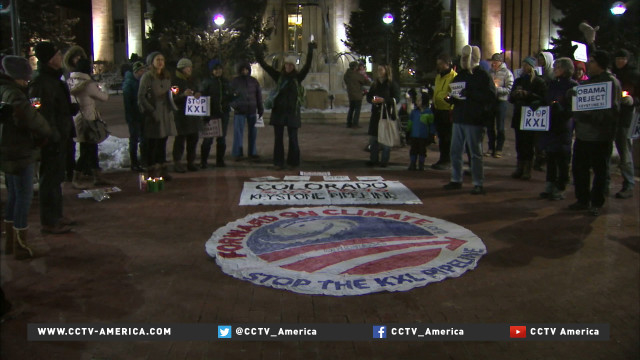A final vote on the controversial Keystone XL pipeline could come next week. The Republican-controlled U.S. House of Representatives are poised to approve the project, which would carry crude oil from Canada to refineries in the southern U.S. states. But landowners near the pipeline’s proposed route aren’t going down without a fight. CCTV’s Hendrik Sybrandy reported this story from Steele City, Nebraska.
In America’s heartland, agriculture has been a means to make money and a way of life. Oil is never far from a farmer’s mind.
“I was looking over at my big diesel tank. That’s got to be full every spring. You know, energy security is important to agriculture,” Don Barber, a farmer in Fairbury, Nebraska, said.
For some, oil and life in the state of Nebraska simply don’t mix.

“It’s been an ordeal,” Susan Dunavan, a Keystone XL opponent said. “We never dreamed that we would be having an oil pipeline coming through our property.”
Dunavan is one of a roomful of Nebraskans who came together recently, just days after Nebraska’s Supreme Court upheld the proposed route for the pipeline. Dunavan and some of her neighbors have fought the project, which would run right through the state, for years.
“Should a private corporation that’s in a foreign country be able to condemn Americans’ property for eminent domain? It just does not make sense at all. This is not a school, this is not a highway,” Dunavan said. “I just think it’s wrong.”
TransCanada said the 1,179-mile pipeline would carry 830,000 barrels a day of heavy crude oil from Alberta, Canada to the Gulf Coast of the U.S. via Steele City, Nebraska, a tiny community through which other, smaller pipelines now pass.
Supporters of the project said it would provide much-needed jobs to towns like Steele City and give large stretches of the central U.S. a major economic shot in the arm.
“We’ve got all the resources under the ground right now, we might as well be using it instead of fighting it,” Doug Zimmerman, a Keystone XL supporter said.
Pipeline opponents have said its economic benefits have been vastly exaggerated while its impact on the environment has been underplayed. They are concerned about future underground leaks and spills.
“I think it’s reckless,” Dunavan said. “I think there’s a lot of environmental question marks, I think there’s a lot of moral question marks too.”
Roughly 90 landowners like Dunavan have now been ordered by TransCanada to make their properties available for the XL pipeline.
“It would mean each person who receives a condemnation notice would then be subject to the court’s powers of eminent domain,” the landowners’ attorney Brian Jorde said.
Those landowners continue to fight back in court. Ultimately, the pipeline’s future hinges on the president’s approval.
“Mr. Obama needs to sign the piece of paper and get it over with and quit stalling. Be done with it,” Zimmerman said.
 CGTN America
CGTN America

